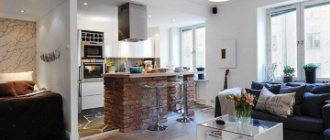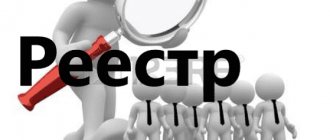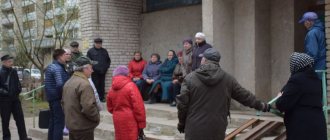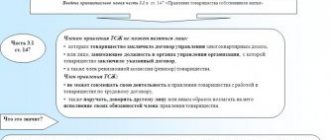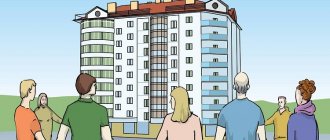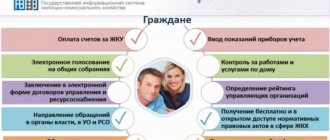Determination of the common property of an apartment building
Chapter 6 of the Housing Code of the Russian Federation, namely Article 36 of the Code, defines the types of property that are common to owners and persons living on the basis of agreements with the owner, including under a lease agreement. Such property is:
- special technical means and equipment of the house, which provide technical, sanitary, electrical and other supplies, stored outside the premises, or in them, serving more than one room within the house;
- staircases and landings, elevator shafts, fire escapes, elevators, technical floors and basements, attics, corridors and rooms providing access to them, as well as areas equipped with utilities, other equipment that serves the premises in this residential building;
- other premises within the house, which are not subject to the individual ownership rights of any of the residents, are freely accessible to people and are intended to provide leisure and recreation for children and adults, sports, cultural and physical development;
- the land on which the house is located, delineated by boundaries, with landscaping facilities, lawns, and green spaces located on it;
- other objects located within the plot of land owned by the house, objects intended for maintenance, repair, improvement and operation of the areas of the house owned by the owners.
Contents order
To maintain the state of the house in compliance with the law:
- it is necessary to regularly inspect the house to determine wear and tear or obsolescence of the structure with its further repair in order to avoid causing any type of harm to the residents of the house;
- it is necessary to keep all communications in proper condition;
- it is necessary to maintain the temperature and humidity conditions established by law in such premises;
- you need to regularly clean the premises and surrounding area;
- it is necessary to ensure timely removal of waste of any type;
- it is necessary to organize a place for the collection of lamps containing mercury for their further disposal in accordance with the requirements of the Law;
- maintain fire safety at home;
- improve and plant landscaping around the house and the buildings located on it;
- carry out timely repairs of both current and capital plans;
- carry out activities aimed at increasing energy efficiency at home;
- installation of common house meters for all types of services supplied by public utilities.
People elected by the general meeting and a person representing the management organization (if elected), working under an agreement concluded with them, are required to inspect housing construction. After the inspection, a corresponding report is written that provides the basis for decisions on repairs of all types. A similar act is written for the initial reception of the house in order to have an idea of the current state of affairs of the home ownership.
To properly use the property and maintain its condition at the level required by law, a management method is selected:
- shareholders by signing a contractual relationship with the company providing these services;
- directly by the owners of the share by signing a contractual relationship with the contractor organization providing such services;
- a homeowners' association or a similar cooperative based on the owners' membership in such an organization;
- a homeowners' association or a similar cooperative on the basis of signed contractual relations between members of the above organizations and non-member shareholders.
At the planning meetings held, the steps and services required for any type of renovation are discussed and approved and the funding for it is raised.
Objects of ownership in an apartment building
Common property, as such, cannot be a separate object of ownership; in order to have the opportunities that the law has given to owners in relation to common property, it is necessary to own a dwelling that is part of an apartment building and own it. If these conditions are met, a citizen may demand the fulfillment of his rights regarding common property.
At the same time, the owner has responsibilities in relation to the common property for its repair, maintenance, and incurring expenses for repairs and maintenance of the house.
It is possible to reduce the size of the common property through complete or partial reconstruction of the house and exclusively with the consent of citizens who have premises in the given house on the right of ownership.
Based on the decision made at the meeting of home owners, it is possible to transfer the property for use to third parties. It should be noted that the procedure and organization of such a meeting must comply with the provisions of housing legislation, namely Chapter 6 of the Housing Code, regarding meetings of owners.
In a situation where the house is destroyed, the owners retain the inalienable right to their share of the land plot as part of the total area on which the house was located, as well as structures and elements intended for the maintenance and operation of the house.
Controversial issues in determining the responsibility of owners
But this is an ideal example of a way to manage common property, and in practice, such moments often cause disagreements, because not all residents understand what is common property. Indeed, not all objects, assets and property located on the territory of a multi-storey building are considered common property. For example, satellite antennas or individual air conditioning systems for apartments (external units of split systems installed on the facades) are private property, and their placement requires permission from the management company, other residents of the building and other competent authorities.
Balconies are the subject of numerous disputes between residents and utility workers. The question of whether a balcony is private property or part of the common housing stock is confusing. According to the rules of the Housing Code of the Russian Federation, the management company is responsible for the integrity and repair of the balcony slab, while the remaining parts - the canopy, roof and parapet - fall under the maintenance of the apartment owner. It is better to find out more about whether a balcony can be common or private property, and what powers residents have (for example, glazing or installing structures for drying clothes) from the management company or the housing inspectorate.
The concept of “common house property” is closely related to another definition - common house needs. Both terms are relatively new and still contain many unresolved issues and controversial issues. The best way to regulate and establish the degree of responsibility for the maintenance, payment of common property and needs is a collective meeting of residents, at which a unanimous decision is made on the procedure for maintenance and payment of current expenses.
Can a management organization dispose of common property?
The management organization does not have the right to dispose of the common property of the owners of premises in an apartment building, since in accordance with Art. 36 of the Housing Code of the Russian Federation, reducing the size of common property in an apartment building is possible only with the consent of all owners of premises in this building.
Articles on the topic (click to view)
- Official rating of lawyers and firms providing legal support for apartment purchase and sale transactions
- Federal Law 159 on the specifics of the alienation of real estate
- How to legally install vestibule doors on a staircase landing?
- The procedure for recognizing housing as unsafe, unfit for habitation and subject to demolition
- Conditions for privatization of the local area of low-rise apartment buildings
- Time frames for eliminating housing and communal services accidents: standards for malfunctions, accidents, breakdowns
- I am an orphan, I want to get married, will I get an apartment after completing my studies?
How to determine the share in the common property of an apartment building
The allocation and calculation of the share is made in accordance with the rules of Art. 37 of the Housing Code of the Russian Federation, according to which it is proportional to the size of the total size of the owned living space.
For example, if the size of the apartment is 300 sq.m., and the entire house is 2000 sq.m., there is only one owner, the calculation is made as follows:
(300 x 1)/ 2000 = 0.15 of the total area.
Art. 37 of the RF Housing Code imposes restrictions on the allocation of shares:
- it is impossible to register ownership of part of the OP;
- re-registration of ownership of a share in the property of an apartment building is carried out simultaneously with the re-registration of ownership of the apartment.
It will not be possible to transfer a share from the OI for use separately.
How are funds received from the use of the common property of the apartment building spent?
By decision of the general meeting, the owners of apartment buildings can use the funds received from the use of common property to:
- improvement of the common property and adjacent territory of the apartment building;
- carrying out repair work;
- to pay for housing and communal services.
The management organization cannot dispose of funds received from the use of the common property of the apartment building without a decision of the general meeting of homeowners.
Expert opinion
Makarov Igor Tarasovich
Legal consultant with 8 years of experience. Specialization: criminal law. Extensive experience in document examination.
Information on the use and maintenance of the common property of an apartment building is contained in Chapter 6 of the Housing Code of the Russian Federation, Decree of the Government of the Russian Federation of August 13, 2006 No. 491
Non-profit partnership “Foundation for Assistance to Local Government Reforms”, 2014
The importance of common property for owners of premises in an apartment building is great. Its proper functioning directly affects the comfortable existence of residents. The financial side is also important - the obligation to maintain joint property is based on the law.
The composition of the common property of a house is regulated by legal norms, and yet disputes regarding the attribution of a particular item or equipment to the joint property of all residents often arise. What are the signs of common property and the procedure for using it?
List of maintenance works when managing a house
If the house is managed by a management organization, in accordance with Part 1 of Article 162 of the Housing Code of the Russian Federation, a management agreement is concluded with such a management organization. Part 2 of Article 162 of the RF Housing Code establishes: “2. Under the agreement for the management of an apartment building, one party (the management organization), on the instructions of the other party (the owners of the premises in the apartment building, the management bodies of the homeowners' association, the management bodies of a housing cooperative or the management bodies of another specialized consumer cooperative...) undertakes to carry out work for a fee within an agreed period of time and (or) provide services for the management of an apartment building, provide services and perform work for the proper maintenance and repair of common property in such a building...”
It is important to understand that relations with the management organization are contractual, and the terms of interaction between the parties to the agreement (one such party is the management company, the other is either the owners of the premises, or the HOA, or the housing cooperative) are determined by a special agreement called the management agreement for apartment buildings.
Clauses 1 and 2 of Part 3 of Article 162 of the RF Housing Code establish: “3. The management agreement for an apartment building must indicate: 1) the composition of the common property of the apartment building in respect of which management will be carried out, and the address of such a house; 2) a list of works and (or) services for the management of an apartment building, services and works for the maintenance and repair of common property in an apartment building, the procedure for changing such a list, as well as a list of utilities provided by the management organization .”
It follows from the above norm that the list of works and services for the maintenance of residential premises is established by the management agreement. At the same time, in accordance with paragraph 17 of the Rules for the maintenance of common property in an apartment building, approved by the RF Government of August 13, 2006 N491 (hereinafter referred to as Rules 491), the list of services and works, the conditions for their provision and implementation are required to be approved by the owners of the premises at a general meeting. It should be noted that this provision of Rule 491 is mandatory.
In addition, it should be noted that, according to paragraph 1 of Article 432 of the Civil Code of the Russian Federation, an agreement is considered concluded if an agreement is reached between the parties in the required form on all essential terms. According to the civil legislation of the Russian Federation, essential conditions are the subject of the contract, conditions that are named in the law or other legal acts as essential or necessary for contracts of this type, as well as all those conditions regarding which, at the request of one of the parties, an agreement must be reached. If at least one of the essential conditions is not determined by the parties, the management agreement cannot be concluded. At the same time, paragraph 2 of part 3 of Article 162 of the Housing Code of the Russian Federation (cited above) establishes as essential terms of the management agreement, among other things, “a list of works and (or) services for the management of an apartment building, services and works for the maintenance and repair of common property in an apartment building home, the procedure for changing such a list, as well as the list of utilities provided by the management organization.”
From a systematic analysis of the above standards, it follows that approval of the list of services and works for the maintenance of housing as part of the terms of the management agreement falls within the powers of the general meeting of premises owners . In addition, without approval of such a list, a management agreement cannot be concluded, since the specified list refers to the essential terms of the management agreement.
Separately, it should be noted that if the owners of the premises have not chosen the method of managing the apartment building or have not implemented the chosen method of management, then the terms of the management agreement, including the list of works and services for the maintenance of residential premises, are determined based on the results of an open competition for the selection of a management organization, carried out by a local government body in accordance with Part 4 of Article 161 of the RF Housing Code. This case is not considered in this publication.
Determining the procedure for using common house resources
The procedure for using shared resources by residents is determined by housing and civil regulations. Owners own, use and dispose of common property within the limits established by law. Residents have the same scope of rights to operate it and, accordingly, responsibilities for its proper maintenance.
Common property can be reduced (through reconstruction) only with the consent of all its share owners. Common objects may be transferred to other persons for use by decision of the meeting of owners. The condition for the transfer is the absence of infringement of the rights and legitimate interests of other participants in civil legal relations.
For example, residents decided to rent out the basement, which is part of the common property of an apartment building, for trading. To make such a decision on the disposal of the basement, it will be necessary to convene a meeting of owners.
Subsequent use by tenants of the common property of an apartment building should not be to the detriment of the rights of the owners. Use of common property by third parties is permitted only with the consent of all owners.
If the apartment building is destroyed or demolished, the owners retain the right of common ownership of the land plot. The share in such common property is proportional to the share in common ownership of the property on the date of destruction (demolition).
How does the division of responsibility work?
The entire common property of an apartment building must be listed in the documents for a residential multi-storey building. These include:
- public housing documents;
- papers for functioning metering devices;
- acts of replacement and inspection of meters, equipment and communications;
- acceptance certificates for emergency, planned or major repairs;
- transfer deeds from the developer and other official documents.
Read also: Where can you complain about a management company in the housing and communal services sector?
The exact list of documents may differ for each apartment building depending on the form of management.
The method of maintenance and repair of common property is regulated by Resolution No. 491, as well as the Housing Code. Usually, the procedure for payment for common use, repairs and provision of the needs of the common housing stock of an apartment building is determined jointly at a meeting, especially if the house is under the control of a HOA. For example, the issue of purchasing and installing metering devices is usually decided by residents themselves. Since house meters are collective property, the responsibilities for their acquisition and installation are performed by residents, who must contribute their share of the funds. This rule also applies to other types of equipment and devices that are collectively owned.
The maintenance of other collective property follows the same principle: if it is necessary to repair, replace or modernize any of the components of the common property, the contractor (service company or utility provider) determines the total cost of the work and distributes it among the residents.
What happens if you use property without consent?
Without the consent of the meeting, it is unlawful to use the common property of the owners of premises in an apartment building. The use of the common property of the owners of an apartment building is possible in compliance with the norms regulated by the Code of Housing Legal Relations.
The use of common shared property of residents of an apartment building in violation of legal norms may be considered illegal.
For example, the customer under an energy service contract should be the person responsible for the maintenance of a residential building, who has the right to enter into a contract only with the written consent of each owner. Otherwise, the contract will be declared void (based on the Energy Supply Law).
Who manages these resources?
How to structure the process of maintaining common property in accordance with the requirements? Who directly translates content activities into reality?
This is done by concluding an agreement (contract) with the management company. The general meeting of owners determines a suitable management company and, on the basis of the concluded agreement, powers of maintenance are delegated to it.
The management company, representing the owners, signs contracts with resource supply enterprises, with organizations carrying out repairs and house maintenance work. The company carries out activities determined by the meeting of owners.
Management of common property can be carried out through the formation of an HOA. The homeowners association solves maintenance problems in a similar way to the management company. Owners who are not included in the HOA enter into an agreement with the partnership on the maintenance and repair of the property. This control option is convenient for houses with a small number of apartments.
The method of management is established at the meeting. The decision of the meeting of owners is valid if there are two-thirds of the votes.
What is the actual situation?
It should be noted that the management authorities/homeowners associations/housing cooperatives themselves often explain that the list of works and services for housing maintenance is established by the Government of the Russian Federation, and the owners of the premises cannot in any way influence this list or the frequency of performance of works and services. In addition, often the initiators of the general meeting of owners of apartment building premises (or the general meeting of HOA members), at which the composition and frequency of work and services for housing maintenance are approved, do not discuss this list with the meeting participants; the issue of approving this list is indicated on the agenda and not attracts special attention from voters. These circumstances contribute to strengthening the opinion that the owners of premises do not have the authority to change the composition and frequency of maintenance work and services.
Taking into account the fact that supporters of such a widespread misconception in no way prove their position, it is advisable to talk not about refuting the false theory, but about explaining the procedure for approving the composition and frequency of work on maintaining residential premises.
For a more complete understanding of the procedure for determining the composition of services and work for housing maintenance, we will first indicate the general requirements for the specified work and services, and then separately consider two cases: 1. management of the house by a management organization (MA); 2. management of the house by a homeowners association (HOA).
At the same time, we note one important point. In accordance with Part 2 of Article 161 of the Housing Code of the Russian Federation (LC RF), owners not only have the right, but are also obliged to choose one of the proposed methods of managing an apartment building (MAD): management organization, HOA (or housing cooperative, other consumer cooperative), direct management (if the building has no more than 30 apartments). Despite the fact that Part 2 of Article 161 of the Housing Code of the Russian Federation directly prohibits simultaneously choosing two control methods in one apartment building, Part 2 of Article 162 of the Housing Code of the Russian Federation establishes a “ loophole ”, using which you can, having formally chosen one control method, in fact implement two methods simultaneously home management. This situation is possible if the HOA management method has been chosen for the house, and the HOA has entered into a management agreement with the management authority (such an agreement can be concluded between the HOA and the management organization in accordance with clause 1, part 1, article 137, part 2, art. .162 Housing Code of the Russian Federation) - in this case, despite the choice of the method of managing the HOA, the building will actually be managed by the MA. For the purposes of this article, this case is referred to as the case of management of the house by the MA.
Formation and control of the fund of common funds of owners
The owners' cash fund is a special account where money is accumulated and allocated for major repairs of common property in an apartment building. The special account is replenished with monthly payments from the owners for major repairs, penalties, and bank interest.
The purpose of the account does not allow resources to be directed to needs other than major repairs.
The right to a special account belongs to the owners. The size of each share is proportional to the amount of payments for major repairs of all owners - the owners of each apartment. The allocation of a share of financial resources cannot be announced. When selling an apartment (premises), the buyer becomes the owner of part of the capital repair fund.
Holding a general meeting of apartment owners
The general meeting of owners of premises in an apartment building is a governing body. The meeting is held through:
- personal presence of each owner of the residential premises;
- absentee voting;
- mixed form.
A meeting should be held annually (usually in the second quarter). The owner may initiate the convening of an extraordinary meeting. Such a meeting is valid if more than 50% of all owners are present. If the required number of participants is not present, the annual meeting is convened again.
Actions regarding common resources are implemented based on the results of voting by meeting participants: decisions are made by a majority of votes, certain issues require 2/3 votes or complete unanimity. The voting results are confirmed by protocols in accordance with established requirements.
Decisions, as well as protocols recording voting results, certify facts, the consequence of which may be a change in rights and obligations in relation to common property.
